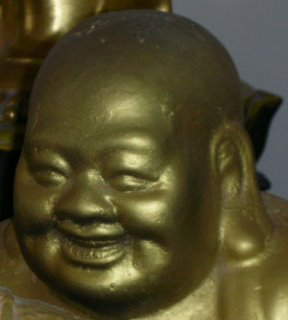Rub my tummy and I'll tell you The Meaning of Life
I read magazines from the back page to the front. Don’t know why, but unless you want to read this blog like that, to make sense of today’s, read yesterday’s first.
The many names of the fun-loving “ fat guy” attest to the widespread appeal of the Buddha of the Future, the Maitreya: he’s big-bellied Buddha, the fat Buddha, the broad smile Buddha, the rich Buddha, the giving- children Buddha.
In addition to material goods and fertility, he also offers comfort. In some South East Asian and East Asian temples his statue is accompanied by the following lines: "His belly so huge as to accommodate everything unbearable; his mouth so wide-open so as to laugh at everything ridiculous.”. As affection for the fat Buddha grew in agrarian societies that certainly knew the realities of scarcity, so the well-rounded body promises abundance as well as symbolising happiness and good luck. Chinese mythology takes the stomach to be the fount of the soul and centre of life energy so Hotei’s massive girth is interpreted as corresponding with his boundless compassion and open-heartedness.
Hotei’s accessories carry important messages too. The sack never empties and is filled with not only the woes of the world, but with precious things. Some statues show the children at play over the ample slopes of the monk’s reclining body. ( See yesterday’s picture too.) In some representations the monk carries a fan, a symbol traditionally indicative of the granting of wishes or petitions by rulers.
Basically, the Laughing Buddha is there to tell you to ‘lighten up’, take a cheerful approach to life’s vicissitudes. He takes under his wing the weak. He has a soft spot for children and looks out for fortune tellers and even bar tenders. One story, at odds with the legend of the goodly monk, explains Hotei’s frequent appearance in the windows of the goldsmith’s shop by asserting that in an early earthly incarnation he was in fact the first goldsmith. He worked in the palace of the historical Buddha but stole ingots of precious metal, forcing the Buddha to have him pursued, bound by a magic cord and fetched back to the palace, where he presumably reformed.
For over a thousand years now, the fat, laughing Pra-Maitreya been one of the most popular subjects of veneration in East Asia, and as such he has, perhaps inevitably, spawned a wealth of superstition. He is a giver of gifts, so rub his belly and wealth and good luck will be yours. One strand of Japanese tradition has it, that if on New Year’s Eve a group of strangers ask Hotei for identical blessings then Hotei will grant what they ask.
Now, here’s the promised thought for today, the Zen parable on the meaning of life, for whatever attributes believers, interior decorators and garden designers (remember the Buddha water feature?) choose to lend him now in the early 21st century, this story, from Zen Flesh, Zen Bones takes us back to his fundamental philosophy of life.
“Once, …..another Zen master happened along and enquired [of the fat guy], ‘What is the significance of Zen?’
Hotei immediately plopped his sack down on the ground in silent answer.
‘Then,’ asked the other, ‘what is the actualisation of Zen?’
At once the Happy Chinaman swung the sack over his shoulder and continued on his way.”
If just one person relaxing in their garden gazes idly on their newly purchased novelty Fat Buddha water feature and finds happiness and contentment and sufficiency for even a moment, then maybe the end justifies the apparently demeaning means.


No comments:
Post a Comment